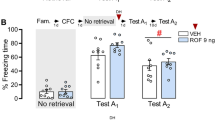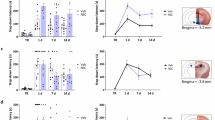Abstract
One-trial step-down inhibitory (passive) avoidance training is followed by two peaks of cAMP-dependent protein kinase (PKA) activity in rat CA1: one immediately after training and the other 3 h later. The second peak relies on the first: Immediate posttraining infusion into CA1 of the inhibitor of the regulatory subunit of PKA, Rp-cAMPS, at a dose that reduces PKA activity during less than 90 min, cancelled both peaks. Long-term memory (LTM) of this task measured at 24 h depends on the two peaks: Rp-cAMPS given into CA1 0 or 175 min posttraining, but not between those times, blocked LTM. However, the effect of immediate posttraining Rp-cAMPS on LTM could not be reversed by the activator of the regulatory subunit of PKA, Sp-cAMPS, given at 180 min, which suggests that, for LTM, the first peak may be more important than the second. When given at 0, 22, 45, or 90, but not at 175 min from training, Rp-cAMPS blocked short-term memory (STM) measured at 90 or 180 min. This effect of immediate posttraining Rp-cAMPS infusion on STM but not that on LTM was readily reversed by Sp-cAMPS infused 22 min later. On its own, Sp-cAMPS had effects exactly opposite to those of the inhibitor. It enhanced LTM when given at 0 or 175 min from training, and it enhanced STM when given at 0, 22, 45, or 90 min from training. These findings show that STM and LTM formation require separate PKA-dependent processes in CA1. STM relies on the continued activity of the enzyme during the first 90 min. LTM relies on the two peaks of PKA activity that occur immediately and 180 min posttraining.
Similar content being viewed by others
REFERENCES
Bernabeu, R., Bevilaqua, L., Ardenghi, P., Bromberg, E., Schmitz, P., Bianchin, M., Izquierdo, I., and Medina, J. H. 1997. Involvement of hippocampal D1/D5 receptor-cAMP signaling pathways in a late memory consolidation phase of an aversively motivated task in rats. Proc. Natl. Acad. Sci. USA, 94:7041-7046.
Bernabeu, R., Schmitz, P., Faillace, M. P., Izquierdo, I., and Medina, J. H. 1996. Hippocampal cGMP and cAMP are differentially involved in memory processing of an inhibitory avoidance learning. NeuroReport, 7:585-588.
Bevilaqua, L., Ardenghi, P., Schröder, N., Bromberg, E., Schmitz, P. K., Schaeffer, E., Quevedo, J., Bianchin, M., Walz, R, Medina, J. H., and Izquierdo, I. 1997. Drugs acting upon the protein kinase A/CREB pathway modulate memory consolidation when given late after training into rat hippocampus but not amygdala. Behav. Pharmacol., 8:331-338.
Bliss, T. V. P., and Collingridge, G. R. 1993. A synaptic model of memory: long-term potentiation. Nature, 361:31-39.
Bourchuladze, R., Abel, T., Berman, N., Gordon, R., Lapidus, K., and Kandel, E. R. 1998. Differential training procedures recruit either one or two critical periods for contextual memory consolidation. Learn. Mem., 5:465-474.
Cammarota, M., Paratcha, G., Bevilaqua, L., Levi de Stein, M., Lopez, M., Pellegrino de Iraldi, A., Izquierdo, I., and Medina, J. H. 1999. Presence of cAMP responsive element binding protein in brain mitochondria. J. Neurochem., 72:2272-2277.
Carew, T. J. 1996. Molecular enhancement of memory formation. Neuron, 16:5-8.
Colley, P. A., and Routtenberg, A. 1993. Long-term potentiation as synaptic dialogue. Brain Res. Revs., 18:115-122.
Emptage, N. J., and Carew, T. J. 1993. Long-term synaptic facilitation in the absence of short-term facilitation in Aplysia neurons. Science, 262:253-256.
Frey, U., and Morris, R. G. M. 1998. Synaptic tagging: implications for late maintenance of hippocampal long-term potentiation. Trends Neurosci., 21:181-188.
Goldman-Rakic, P. 1992. Prefrontal cortical dysfunction in schizophrenia: the relevance of working memory. In B. J. Carroll and J. E. Barrett (Eds.), Psychopathology and the Brain (pp. 1-23). New York: Raven Press.
Goldman-Rakic, P. 1996. Regional and cellular fractionation of working memory. Proc. Natl. Acad. Sci. USA, 93:13473-13480.
Guzowski, J. F., and McGaugh, J. L. 1997. Antisense oligodeoxynucleotide-mediated disruption of hippocampal cAMP response element binding protein levels impairs consolidation of memory for water maze training. Proc. Natl. Acad. Sci. USA, 94:2693-2698.
Huang, Y.-Y., Li, X.-C., and Kandel, E. R. 1994. cAMP contributes to mossy fiber LTP by initiating both a covalently mediated early phase and a macromolecular synthesis-dependent late phase. Cell, 79:69-79.
Izquierdo, I., Barros, D. M., Mello e Souza, T., Souza, M. M., Izquierdo, L. A., and Medina, J. H. 1998a. Mechanisms for memory types differ. Nature, 293:635-636.
Izquierdo, I., Izquierdo, L. A., Barros, D. M., Mello e Souza, T., de Souza, M. M., Quevedo, J., Rodrigues, C., Sant'Anna, M. K., Madruga, M., and Medina, J. H. 1998b. Differential involvement of cortical receptor mechanisms in working, short-and long-term memory. Behav. 1 Pharmacol., 9:421-427.
Izquierdo, I., Medina, J. H., Izquierdo, L. A., Barros, D. M., de Souza, M. M., Mello e Souza, T. 1998c. Short-and long-term memory are differentially regulated by monoaminergic systems in the rat brain. Neurobiol. Learn. Mem., 69:219-224.
Izquierdo, I., and Medina, J. H. 1997. Memory formation: the sequence of biochemical events in the hippocampus and its connection to activity in other brain structures. Neurobiol. Learn. Mem., 68:285-316.
Izquierdo, I., Medina, J. H., Vianna, M. R. M., Izquierdo L. A., and Barros, D. M. 1999. Separate mechanisms for short-and long-term memory. Behav. Brain Res., 103:1-11.
Kawasaki, H., Springett, G. M., Mochizuki N., Toki, S., Nakaya M., Matsuda, M., Housman D. E., and Graybiel, A. M. 1998. A family of cAMP-binding proteins that directly activate Rap 1. Science, 282:2275-2279.
James, W. 1890. The Principles of Psychology. New York: Holt.
McGaugh, J. L. 1966. Time-dependent processes in memory storage. Science, 153:1351-1359.
Martin, J. H. 1991. Autoradiographic matching of the extent of reversible inactivation produced by microinjection of lidocaine and muscimol in the rat. Neurosci. Lett., 127:160-164.
Medina, J. H., Schröder, N., and Izquierdo, I. 1999. Behavioural differences between short-and long-term memory, Behav. Brain Res., 103:119-121.
Micheau, J. and Riedel, G. 1999. Protein kinases: which one is the memory molecule? Cell Molec. Life Sci. 55:534-548.
Paxinos, G., and Watson, C. 1986. The Rat Brain in Stereotaxic Coordinates. San Diego: Academic Press.
Roesler, R., Vianna, M. R. M., Rodriguez, C., Sant'Anna, M. K., and de Paris, F. 1999. N-methyl-D-aspartate receptors in the amygdala and reinforcement of inhibitory avoidance learning in previously trained rats, Neurobiol. Learn. Mem., in press.
Silva, A. J., Kogan, J. H., Frankland, P. W., and Lida, S. 1998. CREB and memory. Ann. Rev. Neurosci., 21:127-148.
Vazdarjanova, A., and McGaugh, J. L. 1998. Basolateral amygdala is not critical for cognitive memory of contextual fear conditioning. Proc. Natl. Acad. Sci. USA, 95:15003-15007.
Vianna, M. R. M., Izquierdo, L. A., Barros, D. M., Medina, J. H., and Izquierdo, I. 1999. Intra-hippocampal infusion of an inhibitor of protein kinase A separates short-from long-term memory. Behav. Pharmacol. 10:223-227.
Walz, R., Roesler, R., Quevedo, J., Sant'Anna, M. K., Madruga, M., Rodrigues, C., Gottfried, C., Medina, J. H., Izquierdo I. 2000. Time-dependent impairment of inhibitory avoidance retention in rats by posttraining infusion of a mitogen-activated protein kinase kinase inhibitor into cortical and limbic structures. Neurobiol. Learn. Mem. 73, in press.
Author information
Authors and Affiliations
Rights and permissions
About this article
Cite this article
Vianna, M.R.M., Izquierdo, L.A., Barros, D.M. et al. Differential Role of Hippocampal cAMP-Dependent Protein Kinase in Short- and Long-Term Memory. Neurochem Res 25, 621–626 (2000). https://doi.org/10.1023/A:1007502918282
Issue Date:
DOI: https://doi.org/10.1023/A:1007502918282




